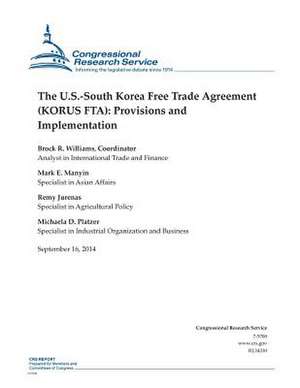The U.S.-South Korea Free Trade Agreement (Korus Fta)
Autor Brock R. Williams, Mark E. Manyin, Remy Jurenasen Limba Engleză Paperback
Preț: 125.29 lei
Nou
Puncte Express: 188
Preț estimativ în valută:
23.98€ • 25.64$ • 19.99£
23.98€ • 25.64$ • 19.99£
Carte disponibilă
Livrare economică 27 martie-10 aprilie
Preluare comenzi: 021 569.72.76
Specificații
ISBN-13: 9781502508263
ISBN-10: 1502508265
Pagini: 56
Dimensiuni: 216 x 279 x 3 mm
Greutate: 0.15 kg
Editura: CREATESPACE
ISBN-10: 1502508265
Pagini: 56
Dimensiuni: 216 x 279 x 3 mm
Greutate: 0.15 kg
Editura: CREATESPACE
